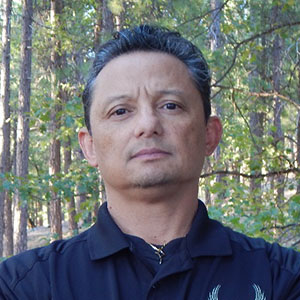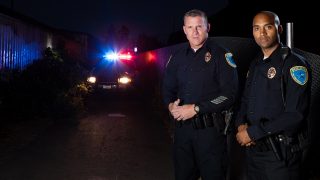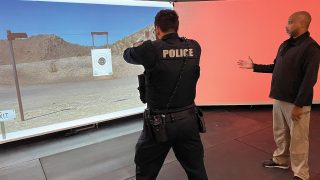
In my last article, I introduced the five factors that need to be present for students to achieve the highest level of performance in the training environment. Ensuring these factors are present during training can translate directly to your performance on the street. These five factors have heavily influenced training outcomes for students in my training classes for over 20 years. The first factor we encountered in my last write-up was speed factors. We saw how these factors can help you create a pattern of technique building using progressive speed adjustments to increase your performance and train at higher risk levels while still balancing safety concerns. Now, we will be moving on to the next set of factors that work in conjunction with the rest to complete this multifaceted concept. All five factors are listed below, and in this article, we will be focusing our attention on internal factors. The internal factors include three different subfactors. They are motivation, mental toughness and confidence. Although I will not be able to address these subfactors exhaustively, I will be able to relay their core facets in this article.
- Speed factors
- Internal factors
- External factors
- Learning factors
- Application factors
Motivation. We will start by explaining how to achieve the successful application of motivation. First, we must understand that motivation is truly intrinsic. It is derived from self-satisfaction and value from within your own self. Contrary to what many people believe, motivation is not a factor that can be given to you by someone else. It is totally incumbent upon you to provide your own motivation during the training process. As the old saying goes, “You can lead a horse to water, but you can’t make it drink.”
We all know the definition of motivation. However, where we sometimes falter is in its application. If we want to reach increased levels of performance and go to places that we have never been before, we must avoid misapplying motivation. Successful application of motivation is not achieved by a well-timed infusion of positive self-talk. It is also not achieved by receiving praise and supportive banter from other individuals. Successful application of motivation is the conscious embracing of the process en route to the goal. For all intents and purposes, it is the journey, not the destination. It is the climb, not the mountaintop. Once you begin to allow the effort and the process to become your motivation for training, then you will never lack motivation. And as we all know, it is impossible to achieve high levels of performance without motivation because the work is hard.
Andrew Huberman is a neuroscientist and tenured professor of neurobiology and ophthalmology at Stanford School of Medicine. On his podcast (tinyurl.com/4d6ywsbr), he explains that proper motivation is learning how to access the rewards from the learning and doing versus the reward at the end. He states, “You have to tell yourself the effort is great, the effort is pleasurable … You can evoke dopamine release from the friction and the challenge that you happen to be in.” Huberman also states that you can make yourself less efficient when you attach the motivation to the end goal. He explains, “You are undermining your ability to lean back into that activity the next time. The next time you need twice as much coffee, three times as much loud music and four times as much energy drink …” There again, motivation is clearly an internal subfactor that cannot be introduced by an outside source. Therefore, your internal motivation must be attached to the effort of achieving, not the achievement itself. This is a critical subfactor for sustained success when performing at higher levels.

Mental toughness. The next subfactor is mental toughness. This can also be defined as perseverance. Achieving high levels of performance and preparation is inevitably hard, so you need to have a certain level of mental toughness. Again, this is another internal subfactor that can only be introduced to the training evolution by you. Mental toughness is an integral component of learning during the 24-hour, 365-day training evolution of your life as a law enforcement officer. Mental toughness provides the wherewithal for you to endure the stresses of training. Having a training or preparation mindset is more like a lifestyle versus a regimen, especially when it translates to real-life events that are often encountered in the law enforcement profession (on and off duty). Again, this goes back to my last article when I mentioned the risk matrix analysis. Even though the frequency of the event that you are training for may be particularly low, the risk is incredibly high. So, unless you put in the work (especially when you do not want to …), it is likely that you will not be properly prepared to perform at your highest level during arguably the most dangerous moment in your life.
David Goggins, who is well-known for having a tremendous amount of mental toughness, said this in an interview: “You gain knowledge through suffering. And on the other end of suffering is a world that very few, very few, have ever seen” (tinyurl.com/2p8a8uc8). A commenter related to this interview makes us all challenge our own will to persevere by stating, “You can’t be exposed to Goggins and stay the same without admitting to yourself that you just don’t want it enough.”
I agree with both. If you do not choose to push yourself in training, you will never see what the other side looks like. However, with that said, I want to make sure you understand this point. I am not implying that you need to compare yourself to any other person, their achievements, or their status. This is something you do alone. This is only about you, your best, what you want and how it applies to your current situation. I am directly referring to a self-evaluation that is solely based on your own personal choices. If you do not want to achieve a particular goal, then you have the free will to side-step the necessary training and go on your way. But if you sincerely want to achieve a higher level of performance for yourself and believe it is the only way to stay ready for the inevitable high-risk, low-frequency event in your future, then you will need to subscribe to this subfactor of mental toughness and train past your perceived limits.
Confidence. This internal subfactor is a necessary component in the level of peak performance related to final-task outcomes. Whenever you perceive that you are being pushed past your limits, you will inevitably and constantly be asking yourself if you have the capabilities to perform the task at hand. This is an ever-present mental conversation where this question is answered over and over in your mind as you confront obstacles during the task or event. Your peak performance outcomes are directly related to how you answer the question each time. Doubt can be a mental chasm that your confidence eventually traverses or a debilitating element that arrests your confidence and ends the fight before you can prevail. In a future article, I will discuss the “three-fights concept” that all law enforcement officers must take part in during any conflict they will encounter. But for now, I will touch on one of the components or fights included in the three-fights concept. The fight I am referring to for this article is the fight of confidence in your abilities. Every officer must confront their confidence in their abilities to overcome obstacles. If the officer accepts that the obstacle confronting them transcends their current abilities and then decides that they cannot overcome this gap, they have allowed their confidence to be overrun by the conflict.
This same mental fight is also happening in the criminal’s mind while in conflict with officers. When I worked a fugitive unit, I knew immediately when subjects were overwhelmed and lost the confidence to run or fight during a conflict. It was a physical expression of their current mental state. The subjects would unknowingly drop their shoulders when they lost confidence in their ability to run or fight during the conflict. That is when I knew the conflict had ended in our advantage. It is an occurrence that happens regularly. You can observe this phenomenon for yourself. The next time you are in a conflict with a subject, observe their shoulders. If the subject feels overwhelmed by police presence and has mentally surrendered (arrest of confidence), it will translate to the physical by an observable shoulder drop. Even though my testing cannot be considered scientific, I observed this occurrence repeatedly during my career. So, to redirect this back to training with a subfactor of confidence, we must push ourselves past any perceived notions that our abilities can be overwhelmed by the present circumstances. And, although there will be times when we feel overwhelmed during the training or conflict, we must never allow the chasm of doubt to arrest our confidence and end the fight prematurely. We must always press on.
That was a brief breakdown of the internal factors that influence performance. Thank you for continuing to allow me to relay my thoughts in print and online. If you have any questions, please get in touch. Until then, #staysafe and #stayready.
As seen in the May 2023 issue of American Police Beat magazine.
Don’t miss out on another issue today! Click below:






